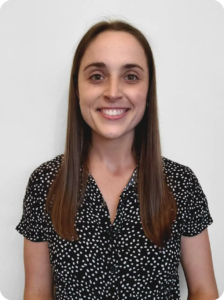Current Research on Endometriosis: An Interview with Alice Mitchell
“I would like to extend my thanks to those who have actively participated in endometriosis research, whether that be clinical trials, surveys, or other types of research studies.”
Teresa Götz: Could you please introduce yourself briefly?
Alice Mitchell: I am a physiotherapist by background, and I am currently completing a PhD at the University of Melbourne to develop and validate a new questionnaire for use in clinical trials to measure the ‘most impactful symptom’ of the condition. It is hoped that this questionnaire will be used in all clinical trials which aim to assess interventions designed to help improve pain and other symptoms. I have an interest in persistent pain science, improving patient-centred care, and preventative healthcare.
Teresa Götz: How did you come to research endometriosis?
Alice Mitchell: I completed an integrated Honours year as part of my Bachelor of Physiotherapy which explored the different types of healthcare professionals Australian women living with vulvodynia seek treatment from, and which treatments are recommended or prescribed by these healthcare professionals. From this experience I developed a passion for persistent pain research, particularly relating to gynaecological conditions. I have a strong interest in conducting research alongside my clinical practice as a physiotherapist, so it felt like a natural course for me to pursue a PhD.
About Alice Mitchell
Alice Mitchell is a physiotherapist by background, and is currently completing her PhD at the University of Melbourne. In her reserach she tries to develop and validate a new questionnaire for use in clinical trials to measure the ‘most impactful symptom’ of the condition. It is hoped that this questionnaire will be used in all clinical trials which aim to assess interventions designed to help improve pain and other symptoms.

Teresa Götz: What fascinates you most about the topic? What is your main motivation?
Alice Mitchell: I am particularly fascinated by the diverse range of symptoms that people living with endometriosis experience. The condition does not present in the same way for each individual, despite having the same pathological disease. This variation in symptom experience is often overlooked in research, and I hope that with the new questionnaire we are developing that each patient’s voice is strengthened and heard.
Teresa Götz: In your opinion, what are the greatest challenges in the field of endometriosis?
Alice Mitchell: The diversity in patient profiles, symptoms experienced, and what patients perceive as being most important all pose great challenges in the field of endometriosis. The symptoms of endometriosis correlate poorly with the extent physical disease and the variation that exists in the symptom experience makes it difficult for healthcare professionals to manage the condition effectively and researchers to truly measure the effectiveness of their interventions.
Teresa Götz: Could you summarize your work for our readers in a few words?
Alice Mitchell: Our team is developing a new questionnaire to measure the ‘most impactful symptom’ of endometriosis. It is hoped that this questionnaire will be used as an outcome measure in all future clinical research trials to tell us if treatments are truly making a difference to people’s lives and improving the unique symptoms for each individual.
Teresa Götz: How can your work contribute to improving the lives of women with endometriosis in the long term?
Alice Mitchell: The development of our questionnaire is beneficial as it allows for the assessment of treatment efficacy according to symptoms that are most impactful to the patient rather than those which may be considered severe (but not cause impact) or outcomes that are solely determined by a clinician (such as the extent of physical disease).
This is reflective of patient-centred healthcare and recognises the importance of patients as valuable contributors to research trials. This new questionnaire will also generate information about symptoms in people living with endometriosis, which may inform further research and may target new treatments towards symptoms that have the most impact on patients which may have been traditionally overlooked.
Teresa Götz: What are your future research goals?
Alice Mitchell: Our goal is to complete the development of our questionnaire using feedback from other endometriosis researchers, healthcare professionals involved in the management of the condition, and importantly patients themselves. It is anticipated once our questionnaire has been fully designed, we will validate it in an endometriosis population to demonstrate adequate psychometric properties.
Teresa Götz: What do you think about digital self-help?
Alice Mitchell: Digital self-help can be a really valuable tool, especially in terms of it being able to offer accessible resources to people regardless of their geographical location. It is also beneficial because it provides people anonymity which may allow some individuals to more easily seek help who may feel uncomfortable or embarrassed otherwise.
Although I think digital self-help is a valuable resource, I do think it needs to be implemented alongside care from a certified healthcare professional; not all digital self-help tools may be accurate, and information from such resources may need to be further explained by a professional to help put it into context for patients.
Similarly, people may lose motivation to stay engaged with digital self-help resources compared to accountability that comes with engaging with a healthcare professional. Overall, it is an exciting way to share information with patients and can be really helpful for some individuals.
Teresa Götz: Is there anything else you would like to share with those affected?
Alice Mitchell: I would like to extend my thanks to those who have actively participated in endometriosis research, whether that be clinical trials, surveys, or other types of research studies. Your involvement is significant and contributes to advancing our knowledge of this condition and making meaningful progress in better understanding and managing endometriosis.
- Current Research on Endometriosis: An Interview with Louis Taffs - 28. June 2024
- Current Research on Endometriosis: An Interview with Dr. Tatjana Gibbons - 13. February 2024
- Current Research on Endometriosis: An Interview with Luana De Giorgio - 12. February 2024
